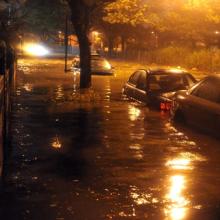financial stewardship
IF IT WASN'T the year from hell for the North American continent, it was the year from a place with a very similar temperature.
It's hard to remember, but it began with that bizarre summer-in-March heat wave that meteorologists described as one of the most anomalous weather events in the country's history. Before long there were record blazes burning in Colorado and New Mexico, and then a stifling heat wave moved east, triggering a "derecho" storm that raced almost 1,000 miles from Indiana to the Atlantic and left 5 million without power. July was the hottest month ever recorded in the United States; it was also when drought descended full force on the Midwest, stunting corn and soybeans and driving the world price of grain up by 40 percent (and making sure our hellish year became traumatic for poor people the planet round). By August it was clear we were in for a record melt year in the Arctic; when the long polar night finally fell, it was clear we'd essentially broken one of the planet's biggest physical features. And all that was before Sandy piled into our greatest urban area, leaving behind an indelible image of the future.
So the question becomes, what's an appropriate response? What even begins to match the magnitude of the trouble we face? What doesn't seem like spitting in the wind?
My sense is that the time has come to take on the fossil fuel industry itself—not the members of Congress they buy in droves each election season, but the real powers. Ignoring the damage they've already caused, these people spend hundreds of millions of dollars each day looking for new fossil fuels. And they spend hundreds of millions each year making sure no government stops them. They're like the tobacco industry at this point, except that instead of going after your lungs they're going after the lungs of the planet.
I’m coming to terms with the realization that I’m a big, fat fake. But at least I’m in good company.
Amy’s birthday was last Sunday. We had just arrived in Portland, so we went to a fancy-pants restaurant, situated several hundred feet above the skyline, with a view of the entire surrounding city, the Willamette River and Mount Hood. We shared a bottle of wine, enjoyed outstanding service and indulged on gourmet food to celebrate her ever-growing tenure as an occupant of our planet.
The bill for the night was nearly enough to cover groceries for our family for up to two weeks.
We could manage it; we knew it was pricey before we got there. And it was fairly easy to justify too. We were making memories. It was an other step in the courtship, helping us fall in love with our new city. We had worked hard over the past eight years, establishing a church in Colorado, struggling to pay bills at times, and we’re now enjoying some material fruits of our labor.
What bullshit.
Seriously, how does anyone really justify spending that kind of money on one meal? After all, from our vantage point on the 30th floor, I could see scads of people below, standing on street corners, tucked in under sleeping bags and beneath cardboard boxes, walking wearily from one job to the next, hoping to pull together enough to make rent.

